第三章翻译中的语言对比分析ContrastiveAnalysisin
- 格式:doc
- 大小:66.00 KB
- 文档页数:5
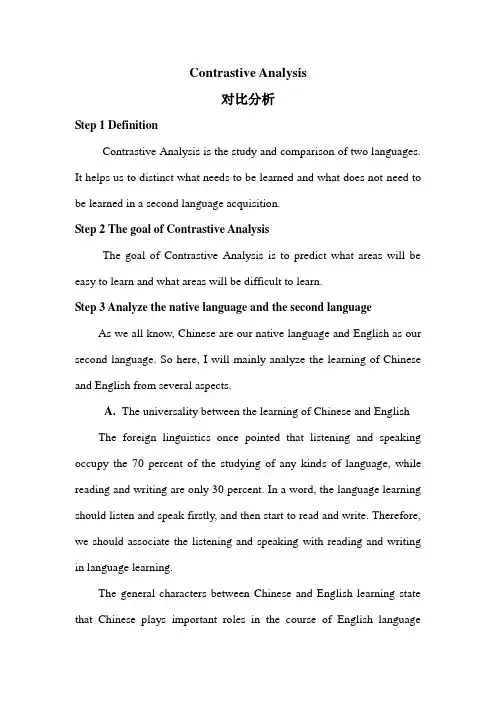
Contrastive Analysis对比分析Step 1 DefinitionContrastive Analysis is the study and comparison of two languages. It helps us to distinct what needs to be learned and what does not need to be learned in a second language acquisition.Step 2 The goal of Contrastive AnalysisThe goal of Contrastive Analysis is to predict what areas will be easy to learn and what areas will be difficult to learn.Step 3 Analyze the native language and the second language As we all know, Chinese are our native language and English as our second language. So here, I will mainly analyze the learning of Chinese and English from several aspects.A.The universality between the learning of Chinese and EnglishThe foreign linguistics once pointed that listening and speaking occupy the 70 percent of the studying of any kinds of language, while reading and writing are only 30 percent. In a word, the language learning should listen and speak firstly, and then start to read and write. Therefore, we should associate the listening and speaking with reading and writing in language learning.The general characters between Chinese and English learning state that Chinese plays important roles in the course of English languageacquisition, though we don’t have enough about what roles it actually plays. The study of the roles that Chinese plays is known as the search of LANGUAGE TRANSFER.However, Chinese may have positive or negative effects on the learning of English. Therefore, there are both positive transfer and negative transfer. For example,➢Chinese: 我喜欢英语。
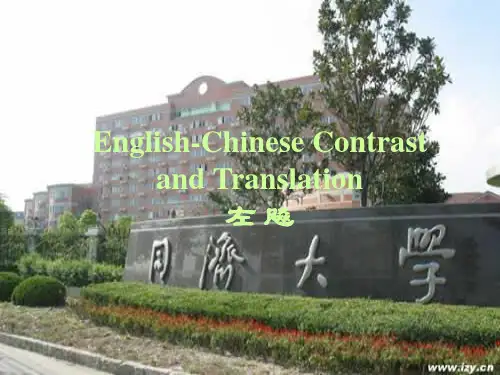
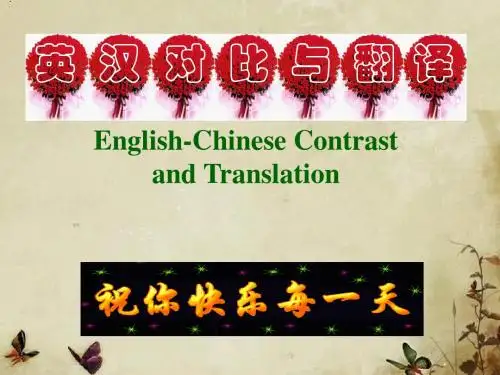
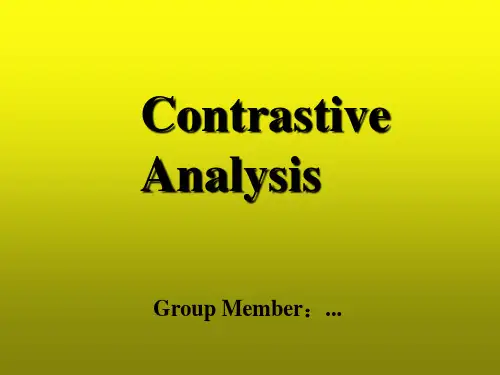
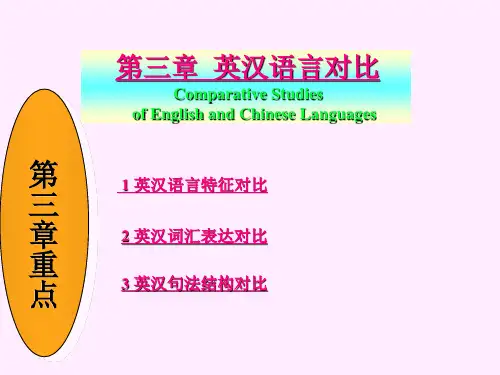

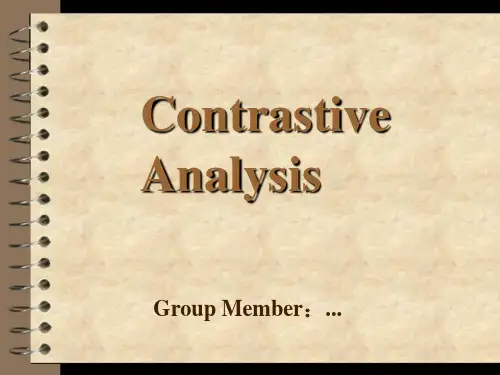
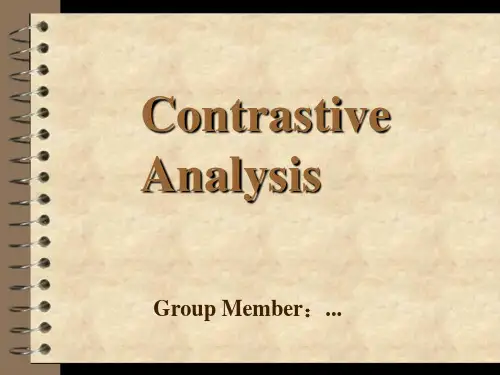
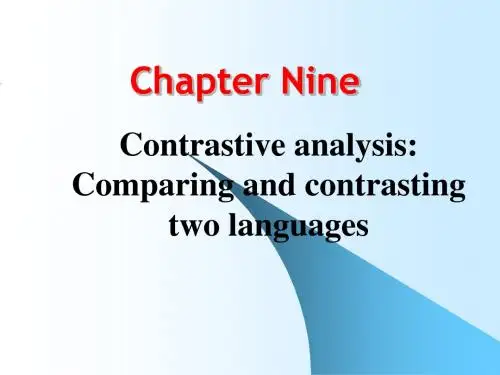
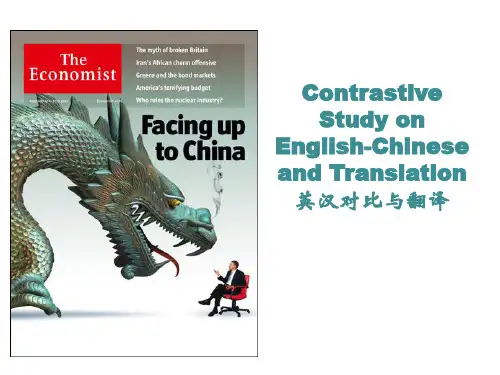
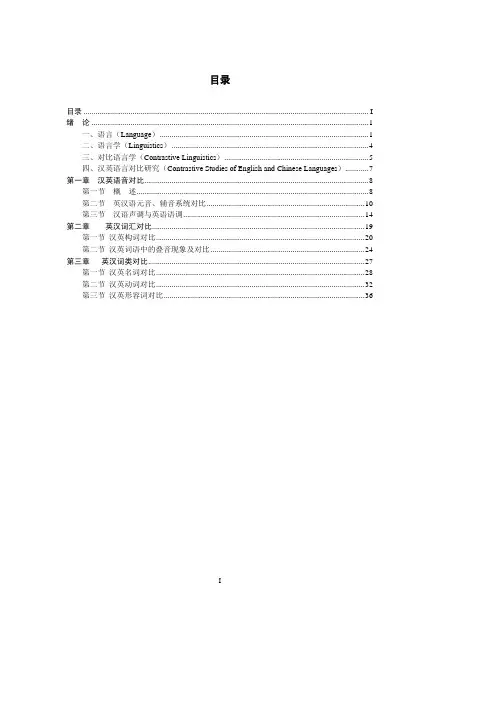
目录目录 (I)绪 论 (1)一、语言(Language) (1)二、语言学(Linguistics) (4)三、对比语言学(Contrastive Linguistics) (5)四、汉英语言对比研究(Contrastive Studies of English and Chinese Languages) (7)第一章 汉英语音对比 (8)第一节概述 (8)第二节 英汉语元音、辅音系统对比 (10)第三节 汉语声调与英语语调 (14)第二章英汉词汇对比 (19)第一节 汉英构词对比 (20)第二节 汉英词语中的叠音现象及对比 (24)第三章 英汉词类对比 (27)第一节 汉英名词对比 (28)第二节汉英动词对比 (32)第三节汉英形容词对比 (36)I绪 论一、语言(Language)语言是伴随人类社会的形成而产生的。
作为一种社会现象、一种交际工具,它是思想的直接呈现,是一种信息系统。
1、语言的定义a. Language is a purely human and non-instinctive method of communicating ideas, emotion and desires by means of voluntarily produced symbols.(Sapir,1921)语言是纯粹人为的、非本能的,凭借自觉地制造出来的符号系统来传达观念、情绪和欲望的方法。
(赵世开译)b. Language is a set (finite or infinite) of sentences, each finite in length and constructed out of a finite set of elements.(Chomsky, 1957)语言是句子(有限或无限)集,每个句子在长度上是有限的,它由结构成分有限的集构成。
(赵世开译)c.语言是一种表达观念的符号系统。
第1讲导论主要内容:从语言对比角度探讨翻译概念阐释、翻译标准厘定、翻译过程梳理、翻译方法运用等与翻译相关的方方面面的问题。
教学要求:了解翻译中的语言比较与对比概念,理解翻译概念、翻译标准、翻译过程等,掌握上述相关概念基本内容及其与语言对比相关的问题。
重点、难点:语言比较与对比概念差异及其之于翻译能力培养的终极意义。
一种事物的特点,要跟别的事物比较才显出来。
——吕叔湘对于中国学生最有用的帮助是让他认识英语和汉语的差别。
——吕叔湘You could know your own language only if you compared it with other languages.——EngelsExplain some of the points:1.Why “contrast” but not “compare”?2.What is “language”?3.What’s the aim of contrastive study of two languages?4.Content of study.5. A general contrastive study of Chinese and English6.Contrastive study of phonetics.Explanation:1. Compare: similarity of two thingsContrast: differences of two things语言对比是指不同语言间的对比分析,通常是通过compare 和contrast两种途径。
比较语言学(Comparative linguistics)的主要任务是寻找不同语言间的共性。
对比语言学(contrastive linguistics)是对两种或两种以上的语言进行共时的对比研究,描述它们之间的异同特别是不同之处。
2. 起步阶段:二十世纪初——二十世纪四十年代末严复、赵元任、吕叔湘、王力停滞阶段:1949——1976复苏和发展阶段:1977年5月后,特别是进入九十年代后3. What is “language”?语言: 语言是一种表达观念的符号系统。
Contrastive linguistics 对比语言学a branch of linguistics which studies two or more languages synchronically, with the aims of discovering their differences and similarities(especially the former) and applying these findings to related areas of study.Particular attention should be paid to similarity on surface but difference in nature.Contrastive linguistics is also known as “contrastive analysis”(CA) or “contrastive studies”. These three terms are largely interchangeable.a linguistic systemis made up of many layers or levels. These layers or levels are often considered to form a scale or hierarchy from lower levels containing the smallest linguistic units to higher levels containing larger linguistic units. So we have, from the lowest to the highest, suc h levels as phonetic level, phonological level, morphemic level, lexical level, syntactic level, textual level and pragmatic level.Features of the two typesTheoretical Contrastive Study. It is language independent.. It looks for universal categories in languages.Applied Contrastive StudyIt is language dependent.It is part of applied linguistics.The major task of it is to identify probable areas of difficulty.Psychological base of CA is behaviorism which was introduced by skinner which viewed first language acquisition as the formation of new habits acquired through repetition and strengthened by the reinforcement of correct responses.Linguistic base of CA is structural linguistics which believed that first learning may interfere second learning.tertium comparationis (TC) 共同对比基础/第三对比项/中间对比项TC: a third thing related in some way to two things: sth. intermediate between two things –criterion for comparison;common basis on which comparison can be made;presupposed similarity between languages against which differences can be meaningfully stated.A synthetic language is “characterized by frequent and systematic use of inflected forms to express grammatical relationships” 人工语言Derivation generally brings about three types of changes: changes in word form, in part of speech (word class), and in meaning. 派生Affixation: add prefix and suffix to a root 附加Reduplication: double part of or all of a root 加倍,重复Modification 1) vowel change 2) suppletion (total modification) 3) stress change 4) tonal modification 修改Affix deletion (back-formation):delete a supposed affix in a long word 词缀删除Abbreviation 缩写synonymy: sameness or close similarity of meaning 同义hyponymy: relationship between a more general, inclusive word and a more specific word) 上下义semantic compatibility: overlapping of part of meaning 语义兼容semantic exclusion: exclusion of meaning 语义排斥Morphological processes: ways of word formations 形态过程Referential Meaning 参考意义vs. Associative Meaning 联想意义Inflectional morphology 屈折形态inflectional categoriesgender, number, case, tense, aspect, voice and moodsynthetic language 综合语: inflection, funtional words and word orderanalytic language 分析语: word order, functional wordsCategories for syntactic description1. unit: morphemes, words, phrases, clauses and sentences2. structure: arrangement of elements in a unit (syntagmatic relation 横组合关系).3. class: type of elements which can be used to fill in a specific slot in a unit.4. system: group of elements that can fill in the same slot (paradigmatic relation between elements 纵聚合关系)Hypotaxis: The dependent or subordinate construction or relationship of clauses arranged with connectives. 形合Parataxis: The arranging of clauses one after the other without connectives showing the relation between them. 意合英语五种基本句型列式如下:基本句型一:SV(主+谓)基本句型二:SVC(主+系+表)基本句型三:SVO(主+谓+宾)基本句型四:SV oO(主+谓+间宾+直宾)基本句型五:SVOC(主+谓+宾+宾补)text is not a random gathering of sentences but a semantic unit ranging from a sentence or even a word and phrase to a piece of work as long as they have texture including cohesion and coherence. Cohesion refers to the property of being a text created by the use of the linguistic features or resources language has for creating texture. 黏连性Coherence refers to the underlying semantic and logical connection between concepts expressed in the text. 连贯性Pragmatics 语用学It is concerned with the use of language, i.e., how the speaker conveys and the hearer understands the utterance in a certain situation.A locutionary act is the act of uttering words, phrases, clauses. It is the act of conveying literal meaning. 言内行为An illocutionary act is the act of expressing the speaker’s intention. It is the act performed in saying something. 言外行为A perlocutionary act is the act performed by or resulting from saying something. It is the consequence of, or the change brought about by the utterance. It is the act performed by saying something. 言后行为古典修辞学把劝说性演说的写作过程分成5个阶段:invention(觅材取材)arrangement(布局谋篇)style(文体风格)memory(背诵记忆)delivery(演说技能)这5个阶段也是演说的5个基本要素(常称作五艺)。
第三章翻译中的语言对比分析Contrastive Analysis in Translation1.The distinctionS between the two languages:1.1语义的差异:英汉词语意义并不是总是一致的,它们的对应程度有三:1.1.1完全对应:1.1.1.1科技术语和专有名词:aluminum铝;physics物理学;pneumonia肺炎;ew York纽约; the Himalayas喜马拉雅山European Union 欧盟negotiating table 谈判桌trading partners 贸易伙伴1..1.1.2产生活常见事物的名称1.1.2部分或大部分对应cat:She is a cat.=she is callous and cruel;1.1.3完全或大部分不对应commuter (people who live in the suburb but go to work downtown )pandemonium=“地狱”(造词)1.1.4英语词汇的一词多义touch :to touch sb to the heart触动心旋hair touched with grey有点花白头发to touch glass碰杯to touch one’s lips to the child’s forehead轻吻小孩的前额to touch the highest point in one’s career达到事业的顶峰1)It’s too noisy; turn that things off and do your homework.关掉那玩意(收音机),做作业!2)I’ll pack my things for the trip tomorrow.我明天打点行装。
3)What a fine thing for our girls!真是女儿们的好福气啊!4)The large mammalian brain is the most complicated thing, for its size, known to us.大型哺乳动物的大脑,就其体积而言,是我们所知晓的最复杂的机体。
1.1.5 Collocation: the collocation of the English words is very active.as proud as a peacock非常骄傲的/Hitler was once as proud as a peacock曾是个不可一世的家伙/ as cheerful as a lark非常高兴的,兴高采烈的/ as clear as day一清二楚/ as quiet as a mouse非常安静的,一声不响的/ heart and soul全心全意地/ in a breeze轻松地/ with flying colors 出色地;成功地/ behind the scenes在幕后/ at a gallop飞快地;急速地;用最快速度1.21.2.1动词时态的体现:1)Mrs. Long has just been here, and she told me all about it. 刚刚来过,她把这事一五一十地全告诉我了。
2) A good book may be among the best of friends. It is the same today that it always was, and it will never change3)”What was I talking of?” said he, beginning again when they were all in the street. 我刚才说什么来着?等大伙来到街上,她又说了起来了。
4) Britain ‘s railway system is being improved.正日益完善。
5)English prose is elaborate rather than simple. It was not always so.如今的英国散文华美而欠简朴,以往的情况却并非如此。
1.2.2量词的增补表达法:1) To the east a faint pink is spreading.一抹浅红正向东方扩展。
2)Before I arrived in sight of it, all that remained of day was a beamless, amber light along the west; but I could see every pebble on the path, andevery blade of grass, by that splendid moon.在我还没有望见那座住宅,天早已暗下来了,只有西边天际还剩下一模一抹朦胧的琥珀色的余辉,但是我仍可借助皎洁的月光,看清小路上的每一颗石子,每一片草叶。
3)Please go there and give it to him.到那里去一趟,然后把这个交给他。
4)I was extremely worried about her, but this was neither the place nor the time for a lecture or an argument.我真替她万分担忧,但此时次地既不不宜教训她一番,也不宜与她争论一通。
1.2.3增补语气词1) Is more growth really better?经济发展得越快越好吗?2)Tess is queer.苔丝的脾气可古怪呢。
3)“My dear Mr. Bennet,” replied his wife, “how can you be so tiresome! You must know that I am thinking of his marrying one of them/my daughters”(J. Austen: Pride and Prejudice)你怎么这么令人讨厌告诉你吧!,我在琢磨他娶她们当中的一个做太太呢!4)John blinked a few times and looked at me as if I might, indeed, be loony. “ Mom, it’s just the moon. Is this the surprise?”眨了几下眼,盯着我看,仿佛我真的疯了似的. “妈妈,不就是个月亮而已嘛! 有什么好希奇的?”1.2.4代词使用上的差异:1)Caroline has known me all my life. It was my privilege to see her out of hers. 了解我的一生, 能为她送终是我莫大的荣幸.2)Money is a wonderful thing, but it is possible to pay too high a price for it.金钱是个很好东西,但是人可能为之付出过高的代价.3)The first point about chores is that they are repetitive. They come every day or thereabouts, and once done they require after a certain time to be done again.( A.Heckscher: “Doing Chores”)家务事的第一个特点,是反复做.几乎天天都有,而且做完之后,过一段时间又要重做一番.4)He hated failure ; he had conquered it all his life, risen above it, despised it in others.它讨厌失败,它一生中曾战败失败,超越失败,并且藐视别人的失败。
5)Happy families also had their own troubles幸福的家庭也有幸福家庭的苦恼。
1.3.句法差异1.3.1形合与意合的差异英语的形合句翻译成汉语的意合句1)As I resumed walking I blurted out, “It’s a lucky thing it happened that way. You wouldn’t have met Mother. ”我们继续往前走,我又冒出一句话:“这样倒是一件幸事。
不然,你就遇不上你妈妈了。
”2)Over time, Kelley has learned to move her fingers enough to use a computer and to get around daily with the help of a wheelchair.随着时间的推移,凯里学会了灵活地移动手指并可以使用计算机,借助电动轮椅,能够处理自己的日常生活。
英语的形合句汉语也可以用汉语的形合句来翻译1)You and the girls may go, or you may send them by themselves, which perhaps will be still better, for as you are as handsome as any of them,Mr. Bingley might like you the best of the party.你带着女儿们去就行了,要不你索性打发她们自己去,这样或许更好些,因为你的姿色并不亚于她们中的任何一个,你一去,宾利先生到看中你呢!2)It will be no use to us, if twenty such should come since you will not visit them.既然你不肯去拜访,即使搬来二十个,那对我们又有什么用呢?1.3.2语序的差异:1.3.3.1定语的语序的差异1.3.3.1.1单词做定语◆形容词作定语:1)That altered, frightened, fat face told his secret well enough.他的胖脸蛋吓得走了样,他心里的想法全写在脸上。
2)She had such a kindly, smiling, tender, gentle, generous heart of her own.她心地善良,性格乐观,温柔和气,待人慷慨。
3)I saw a little, yellow, ragged, lame, unshaven beggar.我看见一个要饭的,他身材矮小,脸色发黄,衣衫褴缕,瘸着腿,满脸胡子1.3.3.1.2英语的短语做定语1)A hotel with a few Chinese touches一家有几分中国特色的旅馆2)A base for underground activities地下活动基地1.3.3.2状语语序的差异:1.3.3.2.1单词做状语1)Predictably the winter will be snowy, sleety, and slushy.可以预言,今年冬天将多雪,多冻雨,多泥泞。